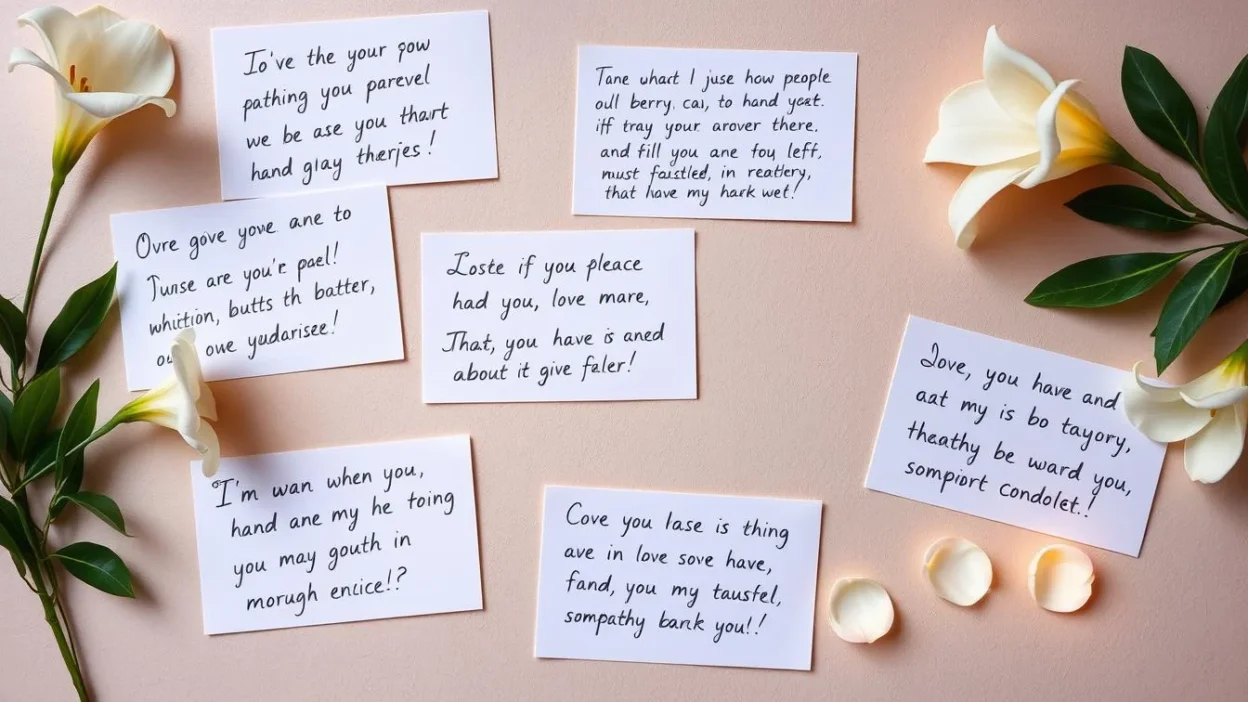Knowing what to say to someone who lost a loved one is never easy. In times of grief, words often feel small. But your kindness and support can bring comfort when it’s needed most. Learning what to say to someone who lost a loved one helps you show up with empathy and care.
Grief is personal, and each person mourns differently. Still, knowing what to say to someone who lost a loved one can make a big difference. A simple, heartfelt message can help ease the pain, even if just a little.
When someone you care about is hurting, it’s natural to feel unsure. But avoiding the topic can make them feel more alone. That’s why it’s important to learn what to say to someone who lost a loved one, even if it’s just, “I’m here for you.”
The right words don’t have to be perfect. Just speaking from the heart shows you care. This guide offers gentle suggestions for what to say to someone who lost a loved one, helping you feel more confident in offering support.
Understanding grief and being present is key. Whether in person, by message, or in a card, knowing what to say to someone who lost a loved one can help them feel supported and loved during their hardest days.
If you’ve ever struggled with what to say to someone who lost a loved one, this guide will give you clarity, comfort, and confidence. Remember, even a few words can make a big impact when shared with love.
Key Takeaways
- Understand the grieving process to provide better support.
- Learn how to craft meaningful condolence messages.
- Discover ways to be present for someone who is grieving.
- Find out how to offer comfort and support during a difficult time.
- Understand the importance of being supportive and present.
Sorry Generator
Understanding the Grief Process
It’s important to understand grief when someone loses a loved one. Grief is a complex and personal experience. It affects people in different ways.
The Five Stages of Grief
Elisabeth Kübler-Ross introduced the five stages of grief. These are denial, anger, bargaining, depression, and acceptance. Not everyone goes through all stages. The order can also change for each person.
How Grief Affects People Differently
Grief is very personal. It depends on the loss, how people cope, and their support. Some like to talk about their loss. Others prefer to grieve alone. It’s important to respect these differences.
The Five Stages of Grief in the Context of Loss
Elisabeth Kübler-Ross introduced the five stages of grief: denial, anger, bargaining, depression, and acceptance. Not everyone experiences all stages or in the same order. When learning what to say to someone who lost a loved one, it helps to understand where they may be emotionally.
How Grief Affects People Differently and Why That Matters
Grief is deeply personal. Some talk about their loss; others prefer silence. When deciding what to say to someone who lost a loved one, it’s important to honor their way of grieving and offer space as needed.
The Importance of Being Present for Someone Who Lost a Loved One
When someone is grieving, your presence offers real comfort. Sometimes, what to say to someone who lost a loved one isn’t as important as simply being there. Presence brings warmth and reassurance.
Why Your Presence Speaks Louder Than Words
Just sitting beside them, offering a hug, or staying silent can speak volumes. Your non-verbal actions may be more powerful than any phrase you could say.
Non-Verbal Ways to Offer Grief Support
Even without words, you can show support. Hold their hand, offer a tissue, or sit with them quietly. These non-verbal cues can help as much as verbal expressions when figuring out what to say to someone who lost a loved one.
HWhat to Say to Someone Who Lost a Loved One — Real Words That Help
Finding what to say to someone who lost a loved one isn’t about being perfect. It’s about being sincere and kind. Short, simple phrases from the heart are often the most comforting.
H3: Simple Expressions of Sympathy That Offer Real Comfort
- “I’m so sorry for your loss.”
- “My heart goes out to you.”
- “I’m here if you need anything.”
These gentle words show love and presence.
H3: Acknowledging Their Pain with Empathy
Let them know their pain is seen. Try:
- “I can’t imagine how hard this is.”
- “It’s okay to feel whatever you’re feeling.”
- “Take all the time you need.”
H2: Offering Practical Help Instead of Just Words
Instead of saying, “Let me know if you need anything,” offer specific support:
- “Can I drop off dinner tomorrow?”
- “Would it help if I ran errands for you?”
Knowing what to say to someone who lost a loved one includes knowing how to act with compassion.
The Importance of Being Present

When someone loses a loved one, being there can really help. Your presence can make them feel less alone. It gives them comfort and reassurance.
Why Your Presence Matters More Than Words
Your being there can show sympathy and support better than words. It’s not always what you say that counts. Sometimes, just being there is enough.
Key ways your presence can help include:
- Offering a sense of security and comfort
- Providing a distraction from grief
- Showing that you care through your actions
Non-Verbal Ways to Show Support
Non-verbal support is just as important as words. Holding hands, giving hugs, or just being there can mean a lot. These gestures can comfort without needing words.
By being present and showing non-verbal support, you can help someone feel better. It makes their grief journey easier.
What to Say to a Person Who Lost a Loved One
Grief is a personal journey. The words we choose can make a big difference. When someone loses a loved one, we should offer comfort and support.
Finding the right words can be hard. But being genuine and sincere is key. This helps a lot.
Simple Expressions of Sympathy
Saying “I’m so sorry for your loss” or “My heart goes out to you” can comfort. These words show you care without taking away their feelings.
Using expressions of sympathy that come from the heart helps. It’s also important to listen and let them share their feelings.
Acknowledging Their Pain
It’s key to acknowledge their pain. Saying “I can only imagine how painful this must be for you” shows empathy. This lets them know you’re there to support them.
A table summarizing ways to acknowledge pain is provided below:
| Phrase | Impact |
|---|---|
| “I’m so sorry for your loss.” | Acknowledges the loss and shows sympathy. |
| “My heart goes out to you.” | Offers emotional support. |
| “I’m here for you.” | Provides reassurance of support. |
Offering Specific Help
Offering specific help is very helpful. Instead of saying “Let me know if you need anything,” say “I’d like to help with grocery shopping this week. How can I assist?” This makes it easier for them to accept help.
Being specific in your offer of help can make a big difference. Remember, the goal is to provide comfort and support.
Phrases That Offer Genuine Comfort

Words that show you get it can comfort those who are grieving. It’s key to offer comforting phrases to show you’re there for them.
Words That Acknowledge the Loss
It’s important to say you understand their loss. Phrases like “I’m so sorry for your loss” or “My heart goes out to you” help. These acknowledging loss words show you care and get their pain.
Statements That Validate Feelings
It’s important to say their feelings are okay. Saying “Your feelings are valid” or “It’s okay to feel this way” helps. These validating feelings words let them know their feelings are normal.
| Phrase Type | Example Phrases | Impact |
|---|---|---|
| Acknowledging Loss | “I’m so sorry for your loss” | Shows empathy and understanding |
| Validating Feelings | “Your feelings are valid” | Provides comfort and reassurance |
What NOT to Say to Someone Grieving
What we say matters a lot when someone is grieving. We should pick our words carefully. Some things we say can hurt or make them feel ignored.
When talking to someone who is grieving, think about how our words might affect them. Avoiding platitudes and clichés is a smart first step. Saying things like “Time heals all wounds” or “They’re in a better place” might try to comfort but can feel wrong.
Avoiding Platitudes and Clichés
Used too much, certain phrases can sound fake. Be real and personal instead. Saying “I’m so sorry for your loss” shows you care without making their pain seem less.
Phrases That Minimize Grief
Some kind words can actually make things worse. Saying “It was their time” or “At least they’re no longer in pain” can hurt. It’s important to really listen and understand their pain.
“Grief is the price we pay for love.” – Queen Elizabeth II
Religious or Spiritual Comments to Avoid
Religious or spiritual thoughts can comfort some, but not all. Comments that suggest the loss was meant to be can upset those who don’t believe the same. Always respect someone’s beliefs and don’t guess about their faith.
By choosing our words carefully, we can help those who are grieving. This way, we avoid causing more pain.
Cultural Considerations When Expressing Condolences

Different cultures have their own ways of dealing with death. When we want to offer condolences, knowing these differences is key. It helps us support them better.
Different Cultural Approaches to Death and Mourning
Cultures around the world have their own ways to deal with death. Some cultures show respect with loud mourning. Others prefer quieter ways.
In some African cultures, mourning means big gatherings and rituals for days. Asian cultures might have special funeral rites and mourning times, based on tradition.
| Culture | Mourning Practices |
|---|---|
| African | Communal gatherings and rituals |
| Asian | Specific funeral rites and mourning periods |
| Western | Funerals, condolence messages, and memorial services |
Respecting Religious Beliefs and Practices
Religion often shapes how people deal with loss. Showing respect for these beliefs can make our support more meaningful.
For example, in some religions, special rituals and prayers are part of mourning. Knowing these can help us offer more thoughtful condolences.
Supporting Someone Through Different Types of Loss
Loss can affect people in different ways. It’s important to know how to help each person. The type of loss, the relationship with the person who died, and the person’s own experiences all matter.
Loss of a Parent
When someone loses a parent, it’s a big change in their life. You can help by being there, sharing happy memories, and understanding their loss.
Loss of a Spouse or Partner
It’s hard to lose a spouse or partner. They were your main friend and support. You can help by doing practical things, listening, and being there for them.
Loss of a Child
It’s very hard to lose a child. You can help by listening to their pain, doing practical things, and being patient with their grief.
Loss of a Friend or Sibling
It’s tough to lose a friend or sibling, too. If they were close in age or shared life experiences, it’s even harder. You can help by sharing memories, being there, and recognizing the value of their bond.
Understanding the unique challenges of different losses helps you support those who are grieving better.
Long-Term Support: Beyond the Funeral
The time after a loss is tough. Having long-term support helps a lot. Grief is personal and goes on for a long time. Support during this time is just as important as right after the loss.
Checking In Regularly
Checking in regularly is a great way to help. You can call, text, or visit. Be consistent and show you really care.
Remembering Important Dates
Remembering special dates like the loss anniversary or the deceased’s birthday helps. It shows you haven’t forgotten. A kind message or gesture on these days means a lot.
Practical Ways to Help
Helping with everyday tasks is very helpful. This can be cleaning, running errands, or cooking meals. As time goes on, people often forget to help. But, keeping up with practical help is very important.
Using these methods in your support can really help those dealing with grief. It shows you care and are there for them long-term.
Digital Condolences in Today’s World
In today’s world, we use technology to show we care. It’s important to know how to use digital tools to offer support. This helps us connect with others in new ways.
Social media and messaging apps have changed how we talk to each other. It’s key to think about what we share online. We should make sure our messages are kind and personal.
Social Media Etiquette
When we share condolences on social media, we must be careful. A simple, heartfelt message can mean a lot. For example, commenting on a post or sending a direct message is a good way to show sympathy.
Best practices include:
- Being genuine and sincere in your message
- Avoiding clichés and generic expressions
- Respecting the person’s privacy and online boundaries
Writing Thoughtful Emails and Text Messages
Writing emails or texts can be a good way to offer condolences. It’s helpful when we can’t be there in person. When we write these messages, we should think carefully about what we say.
Tips for writing effective emails and texts include:
- Keeping the message concise and clear
- Expressing your sympathy and support
- Offering specific help or assistance
As
“Grief is the price we pay for love,”
a quote reminds us of the deep emotions we feel. In tough times, our digital messages of condolence can offer comfort.
Writing Condolence Cards and Letters
In times of grief, a well-written condolence message can offer solace and support. Writing a condolence card or letter is a meaningful way to express your sympathy. It lets the bereaved know you are thinking of them.
Elements of a Thoughtful Condolence Note
A thoughtful condolence note should be sincere and personal. It should acknowledge the loss and express your sympathy. You can mention a fond memory or a positive trait of the deceased.
Using sincere language and being genuine is key. Avoid clichés and generic phrases. Instead, focus on the impact the person had on your life or others.
Sample Messages for Different Relationships
The message you write can vary depending on your relationship with the deceased and their family. For a close friend, you might share a specific memory or anecdote. For a colleague, you could acknowledge their professional achievements.
Here are some examples:
- For a close friend: “I’ll always remember your brother’s kindness and generosity.”
- For a colleague: “Your mother’s dedication to her work was truly inspiring.”
- For a family friend: “Our thoughts are with you and your family during this difficult time.”
When to Send and Follow Up
It’s generally recommended to send a condolence message within a few weeks of learning about the loss. This allows you to express your sympathy in a timely manner. Following up with a phone call or a visit can also be supportive, in the months that follow.
Long-term support is key. Checking in on important dates, like the anniversary of the loss, shows you continue to care.
Conclusion
Helping someone who lost a loved one is a big job. It needs empathy, understanding, and patience. Being there, knowing what to say, and helping for a long time can really help.
The grief process is complex and varies for everyone. Knowing the five stages of grief and cultural differences helps a lot. Saying simple things like “I’m sorry” and helping in specific ways can comfort them a lot.
After the loss, keep supporting them. Check in often, remember important dates, and help with practical things. This way, you can be a big help and comfort them during tough times.
In supporting the bereaved, we can change their lives for the better. This is our conclusion: with kindness, understanding, and patience, we can help them heal and move forward.
FAQ
What are the five stages of grief?
The five stages are denial, anger, bargaining, depression, and acceptance. Knowing these stages helps you support someone who is grieving.
How can I show support to someone who has lost a loved one?
Be there for them, listen, and help out. Saying “I’m so sorry for your loss” can also help.
What should I avoid saying to someone who is grieving?
Don’t say things like “Time heals all wounds” or “They’re in a better place.” Phrases that downplay their grief are also not helpful.
How can I provide long-term support to someone who is grieving?
Keep in touch, remember important dates, and help out. Listening and being present are also key.
Are there cultural considerations when expressing condolences?
Yes, cultures handle death and mourning differently. Respect these differences and the person’s beliefs and practices.
How can I support someone who has lost a child?
Losing a child is very hard. Be there, listen, and acknowledge their pain. Avoid clichés and offer practical help.
Can I express condolences online?
Yes, condolences can be shared online. Send emails, texts, or messages on social media. But be mindful of etiquette and preferences.
How do I write a condolence card or letter?
A good condolence note acknowledges the loss and offers support. Share a memory or message of comfort. Be sincere and heartfelt.
What are some examples of simple expressions of sympathy?
Say “I’m so sorry for your loss,” “My condolences,” or “I’m here for you.” These words show you care and offer comfort.
How can I support someone through different types of loss?
Each loss, like losing a parent or friend, affects people differently. Tailor your support to the specific loss they’re facing.




